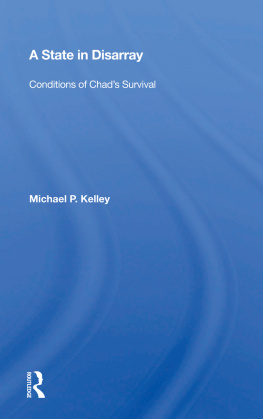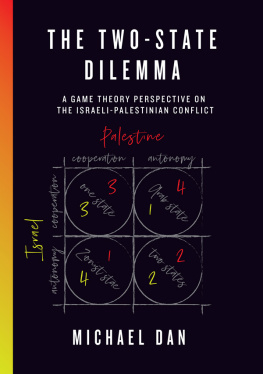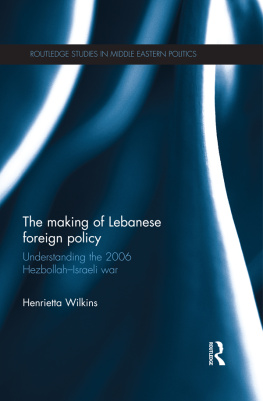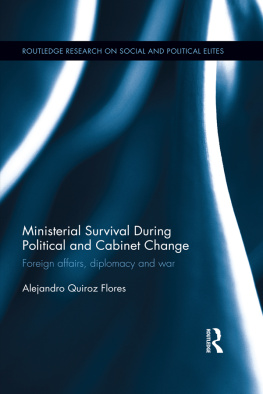A State in Disarray:
Conditions of Chad's Survival
Westview Special Studies
The concept of Westview Special Studies is a response to the continuing crisis in academic and informational publishing. Library budgets are being diverted from the purchase of books and used for data banks, computers, micromedia, and other methods of information retrieval. Interlibrary loan structures further reduce the edition sizes required to satisfy the needs of the scholarly community. Economic pressures on university presses and the few private scholarly publishing companies have greatly limited the capacity of the industry to properly serve the academic and research communities. As a result, many manuscripts dealing with important subjects, often representing the highest level of scholarship, are no longer economically viable publishing projectsor, if accepted for publication, are typically subject to lead times ranging from one to three years.
Westview Special Studies are our practical solution to the problem. As always, the selection criteria include the importance of the subject, the work's contribution to scholarship, and its insight, originality of thought, and excellence of exposition. We accept manuscripts in camera-ready form, typed, or word processed according to specifications laid out in our comprehensive manual, which contains straightforward instructions and sample pages. The responsibility for editing and proofreading lies with the author or sponsoring institution, but our editorial staff is always available to answer questions and provide guidance.
The result is a book printed on acid-free paper and bound in sturdy library-quality soft covers. We manufacture these books ourselves using equipment that does not require a lengthy make-ready process and that allows us to publish first editions of 500 to 1,500 copies and to reprint even smaller quantities as needed. Thus, we can produce Special Studies quickly and can keep even very specialized books in print as long as there is a demand for them.
About the Book and Author
Although independent since 1960, Chad has proved to be one of the least viable African states. Sustained politically and financially by other countries from the outset, Chad's internal warfare has made it the prey of external powers. Yet Chad has survivedan integral element of the Organization of African Unity's Pax Africana and of a peaceful trans-Saharan Africa. Its jeopardized survival is a shaky testimony to the continuing validity of the African continent's colonial-based states-systemunderwritten by the OAU and the UNand at the same time it provides a striking example of the cumulative effects of Africa's post-independence problems. Examining the state's internal weakness and the degree and nature of its foreign involvements, the author focuses on Chad's continuing dilemma: The outside support so crucial for viability is the very thing that undermines its international standing. The roles of Libya, France, the United States, the UN, the OAU, and the trans-Saharan regional subsystem are also analyzed as the author illuminates the quandary of supporting the state without aggravating its conflicts.
Michael P. Kelley received his Ph.D. from the London School of Economics and Political Science. He has recently returned to the U.S. from Paris where he was teaching and conducting research.
To Kimberly
A State in Disarray
Conditions of Chad's Survival
Michael P. Kelley
First published 1986 by Westview Press
Published 2018 by Routledge
52 Vanderbilt Avenue, New York, NY 10017
2 Park Square, Milton Park, Abingdon, Oxon OX14 4RN
Routledge is an imprint of the Taylor & Francis Group, an informa business
Copyright 1986 by Taylor & Francis
All rights reserved. No part of this book may be reprinted or reproduced or utilised in any form or by any electronic, mechanical, or other means, now known or hereafter invented, including photocopying and recording, or in any information storage or retrieval system, without permission in writing from the publishers.
Notice:
Product or corporate names may be trademarks or registered trademarks, and are used only for identification and explanation without intent to infringe.
Library of Congress Cataloging-in-Publication Data
Kelley, Michael P.
A state in disarray: conditions of Chad's
survival.
(Westview special studies on Africa)
Bibliography: p.
Includes index.
1. Chad--Politics and government--1960
2. Chad--Relations--Foreign countries. 3. Chad-
Dependency on foreign countries. I. Title. II. Series.
DT546.48.K45 1986 320.967'43 85-31526
ISBN 13: 978-0-367-00655-6(hbk)
I accept full responsibility for the content of this book but nevertheless wish to recognize the important contributions made by others.
I wrote the original manuscript under the guidance of Keith Panter-Brick while I attended the London School of Economics and Political Science. I am indebted to him for his patience, valuable suggestions, and friendship. Other individuals from LSE I wish to thank are Donald Ross and Jane Wilkins from the British Library of Political and Economic Science and two close friends, Gary Marx and Jon Marks.
While conducting research in Paris, I was shown unequaled hospitality by Bernard Lanne, whose writings and conversations helped to clarify the complexities of the subject matter. Furthermore, I would like to thank Xavier Authie of EDIAFRIC for his friendship and assistance; Glenn Slocum, Pamela Melby, and Liviana Poropat from the Club du Sahel; and the staff members at La Documentation Frangaise and the Ministere de la Cooperation. Finally, I would like to thank Kurt Schafer from the U.S. Agency for International Development mission in Chad for his timely assistance.
Michael P. Keeley
Introduction and Historical Overview
Chad, an independent African state since 1960, has proved one of the least viable. It has been sustained politically and financially from the outset. Its internal divisions, deteriorating by the late 1970s into internal warfare, made it the prey of foreign Powers rivaling for influence. Yet, it has survived. Its very survival is an integral element in the Organization of African Unity's Pax Africana and of a peaceful trans-Saharan Africa, that part of Africa in many ways most vulnerable to such conflicts. Its jeopardized survival is a shaky testimony to the continuing validity of the colonial-based states-system of the African continent, underwritten by the OAU and United Nations, and at the same time a striking example of the cumulative effects of Africa's post-independence problems.
An historical enquiry into the viability of the Chadian state, with a focus on the conditions of its survival, has been prompted by several considerations. First, the more the conflict in Chad has become an international preoccupation and at the very forefront of African debate, the more vital is a proper understanding of the conflict. With the exception of a few important writers, the growing literature on Chad tends only to confuse. Second, the Chadian crisis raises the theoretical question how can such a weak and threatened state nonetheless manage to survive. Robert Jackson and Carl Rosberg argue that "juridical statehood is more important than empirical statehood in accounting for the persistence of the state in Black Africa."cal statehood, that is international legitimacy, accounts for why states survive despite their inability to claim sufficient authority and power to govern a defined territory and population and to remain independent of other states. In effect, many states of Black Africa were unsuccessful in making the transition from being colonial-based territories with a focus on the colonial Power, to independent political institutions. Post-independence governments were not required to exert authority throughout the territory under their jurisdiction because their legitimacy was guaranteed by international recognition following upon the wave of self-determination. They were not required to develop empirical statehood.











![W. Michael Kelley [W. Michael Kelley] - Calculus I](/uploads/posts/book/119087/thumbs/w-michael-kelley-w-michael-kelley-calculus-i.jpg)

